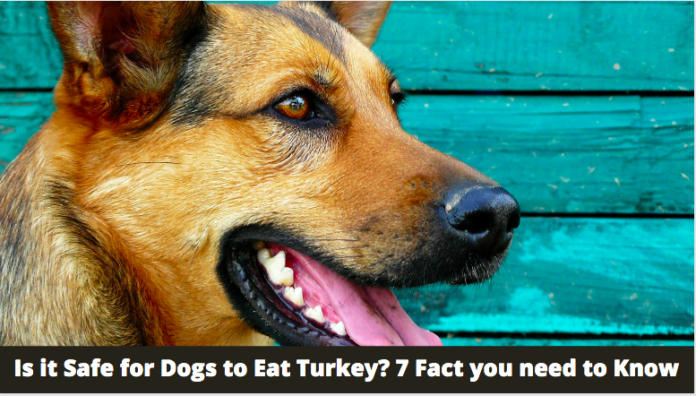Is it Safe for Dogs to Eat Turkey?
If you have a meat-loving dog, it might be very tempting to share a juicy slice of turkey with him, especially around the holidays.
Can dogs, on the other hand, safely consume turkey? Continue reading to find out why it’s usually not in your dog’s best interests to share your Thanksgiving turkey meat, as well as why dogs and turkey bones are a potentially deadly combination.
Is Turkey Meat Safe for Dogs to Consume?
The fact that turkey is a regular ingredient in dog treats and food may have escaped your attention. White turkey meat that has been properly prepared and is skinless and unseasoned is actually safe for dogs to consume in modest amounts.
It is also totally healthy for dogs to eat ground turkey, as long as it is unseasoned and contains no additives.
Not the meat itself, but the fact that it is being fed to dogs is problematic. According to the American Kennel Club, the following are the reasons why you should not enjoy your Thanksgiving dinner with your dog:
Pancreatitis is a disorder in which the pancreas becomes inflamed and enlarged, which can be caused by the fat found in turkey skin. It can also result in major health concerns for your dog, in addition to creating discomfort and anguish for him.
If your dog consumes cooked turkey, the seasoning may irritate his or her bowels and cause digestive difficulties such as vomiting and diarrhea.
Garlic and onions are frequently used in the seasoning of turkey, both of which are harmful to dogs.
Deli meat, turkey hot dogs, and other types of processed turkey meat contain high levels of salt and preservatives, which can be damaging to your dog’s health and cause stomach discomfort. Avoid feeding your dog these products.
Make sure to only give your dog processed meat on rare occasions and in very little quantities.
You can use, for example, a small piece of turkey hot dog to conceal a pill. According to Top Dog Tips, feeding your dog any form of deli meat on a daily basis is not only unhealthy, but it can also be hazardous.
Is it harmful to dogs to eat turkey bones?
While there’s no denying that dogs enjoy chewing and eating bones, the American Kennel Club (AKC) warns that doing so can be hazardous to your pooch.
Small poultry bones, such as those found in turkeys and chickens, are particularly hazardous to consume. Gnawing on bones can lead to the following complications:
- Mouth and throat injuries are common.
- Choking or blockage of the throat
- Blockage of the intestines
- Puncturing the stomach or intestinal lining is a medical emergency.
- Constipation or unpleasant bowel movements are two conditions that might occur.
- Rectal bleeding is a common occurrence.
Some of these ailments, such as intestinal blockage, may necessitate immediate surgical intervention to rectify.
What Should I Do If My Dog Has Already Consumed a Turkey Bone?
In spite of your best efforts, the possibility exists that your dog will come into possession of some forbidden turkey meat or a bone and consume it before you can intervene to prevent this from happening. Not panicking should be your first reaction if something occurs.
You should avoid attempting to take food away from your dog, especially if they are known to engage in aggressive food behaviour.
According to the American Kennel Club, if you suspect your dog has eaten a bone, call your veterinarian for help. They can walk you through the steps to take to limit the chance of injury to your dog.
Keep a watchful check on your pet at all times. If your dog is having difficulties or pain when attempting to defecate a few days after ingesting a bone, contact your veterinarian immediately since shards of the bone may be causing (rectal) irritation.
Other indications that it is necessary to seek veterinary care are as follows:
- Lethargy
- Bloody stool
- Bloated or distended abdomen
- Appetite loss
- Vomiting
- Constipation or straining
- Restlessness or difficulty getting comfortable
Allowing your dog to enjoy the taste of turkey without the risk of ingesting bones or hazardous additives is the safest way to ensure that your dog enjoys the taste of turkey. While you’ll make them eat in peace, you’ll also have peace of mind knowing that their health isn’t in danger.
Fact-Finding:
Thanks for reading and have a great day! Is it Safe for Dogs to Eat Turkey?
Please post your thoughts in the comments section if you have any. Please feel free to share!














